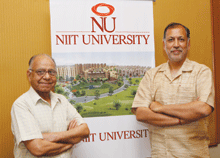It’s the most ambitious project in the history of the Delhi-based NIIT Ltd (estb.1981), India’s premier education multinational with operations including 8,703 learning centres in 40 countries across six continents. NIIT University is rapidly assuming form and substance as per the blueprint of master planner YRM (London) Ltd (one of the world’s most respected campus design firms) on a state-of-the-art 100 acre green campus sited in the fortress town of Neemrana, Rajasthan, in the foothills of the Aravali range. Yet despite the university having plainly been named after the eponymous company, Rajendra Pawar, chairman of NIIT and visionary behind this project, took great pains to distance the university — which plans to admit its first batch of 450 students in September — as a separate, distinct, not-for-profit entity.
 “NIIT University has been conceptualised as a financially, ecologically and intellectually self-sustaining, but not-for-profit institution of undergraduate and postgrad education. It’s visualised as a sturdy and well-equipped ship infused with NIIT’s 27 years of goodwill, experience and technology knowhow, being gently pushed into the sea of contemporary and evolving higher education. After the initial push, it will venture forth on its own on a great voyage of knowledge creation and discovery, independent of the company,” Pawar told your correspondent, who had to muster considerable persuasive skills for Pawar to consent to be interviewed for this cover story. Ultimately Pawar agreed to speak for the record with EducationWorld on condition that he would confine his remarks to matters related to NIIT University.
“NIIT University has been conceptualised as a financially, ecologically and intellectually self-sustaining, but not-for-profit institution of undergraduate and postgrad education. It’s visualised as a sturdy and well-equipped ship infused with NIIT’s 27 years of goodwill, experience and technology knowhow, being gently pushed into the sea of contemporary and evolving higher education. After the initial push, it will venture forth on its own on a great voyage of knowledge creation and discovery, independent of the company,” Pawar told your correspondent, who had to muster considerable persuasive skills for Pawar to consent to be interviewed for this cover story. Ultimately Pawar agreed to speak for the record with EducationWorld on condition that he would confine his remarks to matters related to NIIT University.
Pawar’s hesitation about linking the new university with the profitable sponsor company is hardly surprising. Driven by muddled socialist thinking, over the past 60 years after independence, every government in New Delhi and the state capitals has propagated and practiced government domination of higher education, offering heavily subsidised — and usually sub-standard — collegiate and university education in government owned or controlled institutions. And although the Central and some state governments have nurtured islands of excellence in higher education, e.g Indian Institute of Science, Bangalore, the seven IITs and IIMs, “commercialisation of education” is a much-feared charge which comes easily to the lips of the country’s influential 300 million strong, subsidies-grabbing Indian middle class, with even the newly-liberal Supreme Court of India warning against this moral hazard. Therefore even the most generous philanthropists and social benefactors need to take pains to avoid the taint of commercialisation, or worse, profiteering.
With the Private Universities Bill languishing in Parliament for over a decade because of deep-seated fears of commercialisation of education, Pawar and the co-founders of NIIT Ltd chose to invoke the government of Rajasthan’s education department guidelines for the establishment of private universities, to set up NIIT University in the desert state (pop. 56.4 million). And now with this ambitious new university in which Pawar, Thadani and Rajendran — the founders of NIIT Ltd — have invested an estimated Rs.100 crore by way of corpus and loans, all set to admit its founding batch of 450 B.Tech, M.Tech and Ph D students in September, Pawar is pulling out all the stops to ensure that NIIT University impacts Indian education by offering a globally comparable campus and curriculums.
“Our vision is to make this university into a globally respected centre of innovation in emerging areas of the new knowledge society. Our mission is to provide distinctive education through latest technologies and sustained engagement with research, discovery and knowledge creation to develop high-quality talent which will enable the continuous growth and development of Indian industry and society. Therefore we have designed industry-linked curricula, adopted technology-driven pedagogies and committed ourselves to a research mindset from day one,” says Pawar.
Similarly, no pains have been spared in terms of architecture, landscaping, and residential accommodation, to launch NIIT University on a par with the IIMs, IITs and the state-of-the-art Indian School of Business, Hyderabad. Thus the environmentally-friendly buildings will be equipped with geo-thermal cooling facilities, offer uplifting mountain vistas and feature world- class residential accommodation, with the project cost at full capacity budgeted to rise to Rs.1,000 crore over the next decade.
“Although started with a bias towards technical education, NIIT University will gradually transform into a full-fledged multi-disciplinary university offering students a wide range of subjects — including liberal arts — to mix and match into self-designed curricula. Our paramount objective is to build leaders of tomorrow by setting new standards in university education in India” says Pawar.
Given that a NASSCOM-Mckinsey Global Institute survey of 2005 indicates that 75 percent of engineering and 85 percent of arts, commerce and science graduates of Indian colleges and universities are unemployable, this is a long overdue initiative.